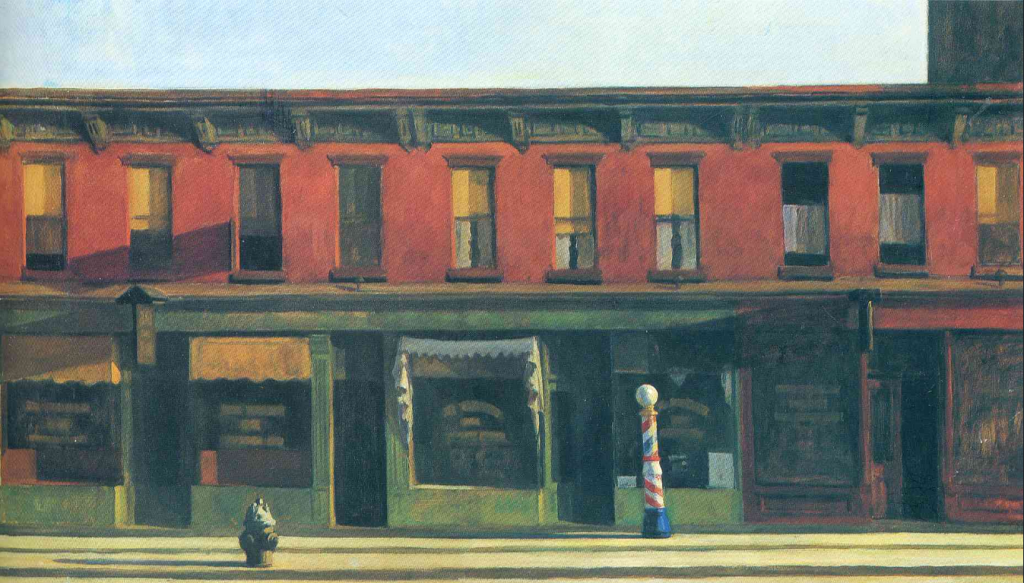We have learned that more is not necessarily better…
President Jimmy Carter, Inaugural Address, January 1977

I re-read Robert Adams’ Art Can Help this week. It’s a slim book of mini-essays, with most of them using a single image, usually a photograph, as a launching point. I find this book to be a comfort read, even though I’m not wild about the second essay, about Edward Hopper’s 1930 work Early Sunday Morning. Adams seems to find Early Sunday Morning ominous and depressing. “The building gives us small reason to celebrate the human spirit,” Adams writes. He describes “the building’s tyranny” and asks, “How can we even bear it?” I see something completely different. I love the warm colors and I can imagine the employees of the ground-floor businesses must be happy to not be working on Sunday. (Apparently “Sunday” was not part of Hopper’s original title, but was added later by others.) I can imagine residents in the upstairs apartments sleeping late or just sitting down to breakfast, the smell of bacon drifting out the windows. What a joy to be the first pedestrian to walk along this sidewalk before the street gets busy on Sunday afternoon. I guess my interpretation is simplistic, Mr. Adams’ description seems a lot closer to Hopper’s actual intentions. I can only comment on how I perceive the work. This is the only essay from Art Can Help where I disagree with him, so I recommend reading it because it’s bound to give you a lot to think about, as it did for me.
- P. 27: “A song can sometimes speak right past the words, calling up intuitions that save us.”
- P. 85: “We are in important ways the sum of the places we have walked. And because the terrain seems so contradictory – peaceful here and terrifying there – the farther we walk the less we are inclined to claim we know.”


I made this delicious PB&J baked oatmeal for breakfast yesterday. I used the recipe from this Instagram reel. The original recipe called for strawberry jam but I used cherry preserves because that’s what was on hand. Delicious and simple recipe.
So Netflix is terminating their DVD business. Bastards. The zombified consumers who have turned their backs on physical media don’t even realize what they’ve lost. For a brief time in the early 2000s, Netflix was a true movie-lovers’ company. They had a vast catalog and they even took seriously customers’ requests for new (or old) films. Once they got into streaming, it was all downhill from there. When they began running ads over the end credits of movies, it was obvious that the people running the company didn’t think much of their customers or even care about the movie-watching experience. Ever since, my relationship with Netflix has been entirely co-dependent, staying with them because they were the only viable option for many of the films I wanted to see. But Netflix has cluttered the global bandwidth with so much garbage in recent years that I can’t say I’ll miss them.
I’ve also started reading Outlier: The Unfinished Presidency of Jimmy Carter by Kai Bird. I’ve always felt that Carter deserved better credit than he got and that the country would have been a lot better off with a second Carter term than with the Liar-in-Chief we got. The book focuses almost entirely on the presidency, with some biographical background in the beginning and a brief post-presidency chapter at the end. Miss Lillian is a hoot, I wish I’d been able to appreciate her more at the time. Advisor Hamilton Jordan asked Carter to put in writing his position on a long series of issues before launching his presidential campaign. Carter represented my own thinking on a surprising number of topics – reducing marijuana possession to a misdemeanor (I’m not certain, but I believe he later came around to support legalization), increased investment in mass transit, creation of a national health insurance program, reducing the defense budget, and nuclear arms reduction talks with the Soviet Union, among other things.

- P. 4: “But in truth, Carter is sometimes perceived as a failure simply because he refused to make us feel good about the country. He insisted on telling us what was wrong and what it would take to make things better. And for most Americans, it was easier to label the messenger a ‘failure’ than to grapple with the hard problems.”
- P. 59: “Like most everything in his life, Carter’s approach to his Southern Baptist heritage was decidedly cerebral. He had been taught, like all Southern Baptists, to accept the doctrine of the ‘Priesthood of the Believer’ – which simply meant that no priest or pastor could stand between the believer and his relationship to Christ. Theoretically, each Southern Baptist could read and interpret the Bible on their own. Cater took this quite literally, and particularly during his navy years, when he had hours of solitary time at sea, he read the scriptures and came to his own conclusions. Unlike most churchgoing Baptists, he was not following the lead of his local pastor, let alone the Baptist hierarchy.”
- P. 207: “No president since Lyndon Johnson had achieved more legislative victories in his first year in office. Politicians on both sides of the aisle complained about Carter’s aloofness and arrogance – but forgotten is the plain fact that this president nevertheless usually got what he wanted from Congress. More of his presidential initiatives became law than did those of presidents Eisenhower, Kennedy, Nixon, or Ford.”